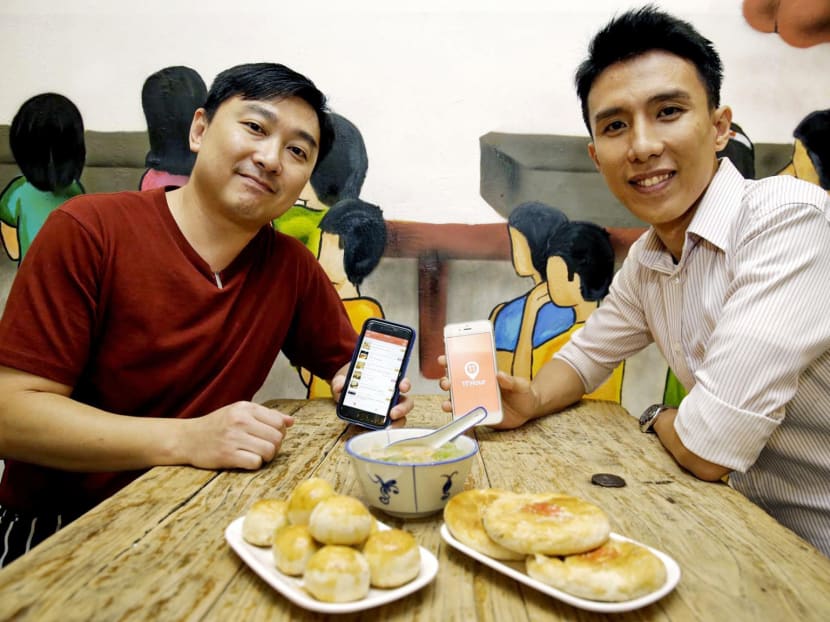An 11th Hour answer to cutting down on food waste
SINGAPORE — When he was selling bak kut teh in Toa Payoh Central, Mr Tan Jun Yuan would have an average of 10 to 15 bowls’ worth of pork and soup left at the end of each day. But it was the scale of food wastage at the economy rice stall next door that inspired him to do something about the issue.

Founder of 11th Hour Tan Jun Yuan (right) with Mr Jordy Lam, one of three partners behind The Happy World cafe. Mr Tan said his app could feature larger chains, franchises, hawkers and supermarkets in future. Photo: Wee Teck Hian
SINGAPORE — When he was selling bak kut teh in Toa Payoh Central, Mr Tan Jun Yuan would have an average of 10 to 15 bowls’ worth of pork and soup left at the end of each day. But it was the scale of food wastage at the economy rice stall next door that inspired him to do something about the issue.
After manpower issues led him to call it a day as a hawker in March 2014, Mr Tan, 30, began working on an app to tackle food waste.
Last month, Mr Tan and two co-founders officially launched the 11th Hour app, which allows food and beverage (F&B) businesses to offer last-minute deals to customers. More than 100 businesses including wine specialist Wine Bos and gelato seller Milkissimo are now on board, and his app has been downloaded about 5,000 times and attracted about 3,000 users.
Merchants offer at least a 30 per cent discount to draw more customers during lull periods of the day, or to reduce the amount of unsold food that would go to waste. 11th Hour’s partner merchants are mostly independent players currently, and Mr Tan plans to reach out to larger chains or franchises in future. He also wants to get hawkers and supermarkets on board, and they could feature in future versions of the app.
The team made changes to the app during its beta phase, lasting about seven months, but much more can be done, said Mr Tan. For instance, he wants merchants to be able to track the number of redemptions and the amount of food waste averted in future. Hawkers might feature in a separate category from cafes and restaurants in the app, he added.
Asked if the app might end up being a tool for businesses to drive up sales by offering discounted drinks — which are much less perishable than food — and food deals several hours before closing time, Mr Tan said some merchants and consumers may be turned off, if the app was solely packaged as tackling food wastage. Merchants might not want to be perceived as having “a lot of leftovers”, for example. “So we re-invented … and angled on last-minute deals, though at the very core, it’s about food wastage,” he said.
The app has benefited merchants such as Bali Lane cafe The Happy World. More customers have come to know about the cafe through 11th Hour, said Mr Jordy Lam, 40, one of three partners behind the venture. The cafe, which sells old-school biscuits and desserts such as bubur cha cha and chendol, opened in early September and joined 11th Hour later that month. In its early days, up to 50 per cent of desserts using coconut milk would go to waste, but this improved to “minimal” levels.
The cafe did not want to “take the risk” and donate the desserts to places like old-folks’ homes, because coconut milk may not suit everyone’s digestive systems, Mr Lam added.
Mr Tan said his app does not divert food that would otherwise go to the needy, if unsold.
“The pie is not fixed,” he said. Some merchants do not donate food because of the time or effort required, or because they feel the food is unsuitable. Others are “galvanised” to cut food waste if they are able to recoup some costs by selling at reduced prices.
Consumers said both the discounts offered and the potential to help cut food waste are draws. “I worked in the F&B industry before and I’ve seen food being wasted every day,” said freelance lifeskills trainer Ida Mariam Iskandar, 26. “I think this is a very good and fun initiative to help solve the food wastage problem.”
Entrepreneur Ranford Neo, 25, has downloaded the app but has yet to make use of the deals. “Both discounts and cutting food waste are appealing to me,” he said. “I think consumers would like discounts more because everyone loves a good deal, especially my friends working in the central business district.”






